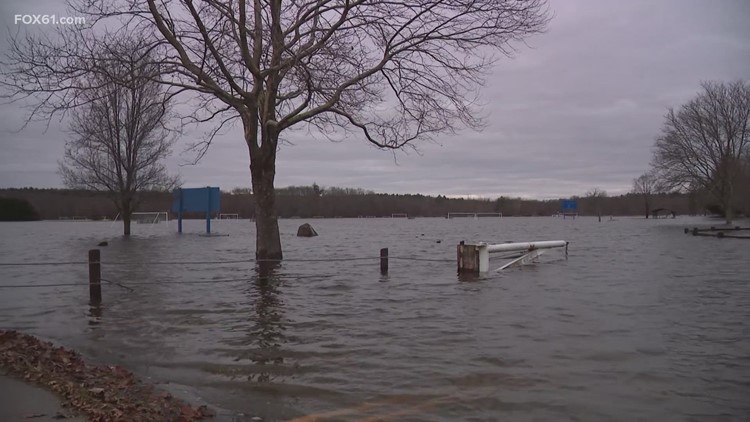HARTFORD, Conn — Heavy rains in the past two weeks have produced flooding conditions around the state and the Connecticut Insurance Department has released advice on how residents can cope with the damage.
"CID is committed to helping to protect Connecticut residents during weather events,” said Commissioner Andrew Mais. “Our tips on flood safety and insurance aim to empower individuals to take proactive measures to protect themselves and their assets. We stand ready to provide assistance and support related to your insurance coverage throughout the recovery process.”
Flood Safety Measures During severe weather conditions, follow safety protocols to protect lives and property:
Stay Informed: Stay updated with weather forecasts through NOAA Weather Radio or reliable local news sources to monitor vital weather-related information.
Move to Higher Ground: If flooding occurs, seek higher ground immediately. Avoid areas prone to flooding, including dips, low spots, and drainage ditches.
Avoid Flooded Areas: Do not enter flooded zones, especially if water is flowing rapidly. Remember, "Turn Around, Don't Drown" - never attempt to cross swiftly moving streams or flooded roadways.
Nighttime Risk: Exercise extra caution at night when it might be challenging to recognize flood risks.
Dealing with Flood Waters. Floodwaters can pose health and safety hazards. Follow these tips to mitigate risks:
Avoid Exposure: Keep children and pets away from floodwaters as they may contain hazardous elements such as debris or contaminants.
Clean and Disinfect: Wash hands often with soap and clean water or use an alcohol-based sanitizer after contact with floodwaters. Discard items that cannot be washed or disinfected such as mattresses, stuffed animals, baby toys and wood cutting boards as well as food that may have come into contact with floodwaters.
Medical Attention: Seek immediate attention if you become injured or ill.
Understanding Flood Insurance. Standard homeowners' and renters’ insurance policies typically do not cover damages caused by flooding. Separate policies can be purchased through the National Flood Insurance Program (NFIP). Flood insurance is essential to protect property and assets from flood-related damage.
Know Your Coverage: Flood insurance covers structural and content damages, but it's essential to understand the coverage limits and specifics. Consult an insurance agent for personalized advice.
Homeowners: Generally, flood insurance policies cover up to $250,000 of flood damage to a home’s structure. A standard flood policy will cover structural damage, including damage to the furnace, water heater, air conditioner, floor surfaces (carpeting and tile), and debris clean-up. The standard NFIP flood policy also provides personal property (contents) coverage for up to $100,000. Contents coverage must be purchased separately.
Renters: Because flood is not covered under a basic renters insurance policy, renters should talk with an insurance agent about flooding risks to decide if flood coverage for belongings is needed.
Business Owners: A basic NFIP flood insurance policy will typically cover up to $500,000 on a non-residential building.
Plan Ahead: Remember, flood insurance policies typically have a 30-day waiting period before taking effect. Prepare evacuation plans, pack go-bags and secure important documents.
Claims Process: Make an inventory of personal belongings.
Recovery and Assistance: In the event of flood-related damage, document the damage and contact your insurance providers.
Contact Information. The Connecticut Insurance Department (CID) encourages affected individuals to visit the department's website for additional resources, information, and guidance.
For specific inquiries, contact CID by phone at (860) 297-3900 or via email at insurance@ct.gov.
Additional Resources
FEMA: Review the Protect Your Home from Flooding Guide and learn more about flood facts and safety on the Federal Emergency Management Agency (FEMA) website.
NFIP: Visit the National Flood Insurance Program (NFIP) website at www.floodsmart.gov for detailed flood risk information by location.
DEEP: Visit the Department of Energy & Environmental Protection’s page on Flood Management (ct.gov)
NAIC: Learn more about flooding with the National Association of Insurance Commissioner’s Flood Insurance Basics
Have a story idea or something on your mind you want to share? We want to hear from you! Email us at newstips@fox61.com
HERE ARE MORE WAYS TO GET FOX61 NEWS
Download the FOX61 News APP
iTunes: Click here to download
Google Play: Click here to download
Stream Live on ROKU: Add the channel from the ROKU store or by searching FOX61.
Steam Live on FIRE TV: Search ‘FOX61’ and click ‘Get’ to download.



